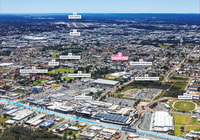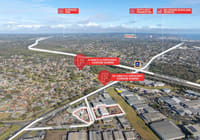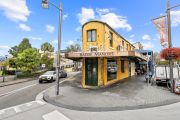
KAM Sports abandons $100m soccer property deal with Western United
A multibillion-dollar greenfield development in Melbourne’s west is in limbo after US property investor Maciek Kaminski abandoned plans to take a $100 million controlling stake in the consortium behind the plans.
Kaminski’s plan to buy a controlling stake in professional A-League soccer club Western United put him in the box seat to develop a 62-hectare site around the club’s home stadium in Tarneit, but Kaminski said on Wednesday he would no longer proceed with the investment.

Kaminski’s withdrawal could be the death knell for Western United, which faces a wind-up hearing in the Federal Court on Thursday over $800,000 of debt to the Australian Tax Office.
Western United had secured a three-week stay of execution in early August on the grounds it needed more time to close its deal with Kaminski’s company KAM Sports.
But on Wednesday, KAM founder, Minnesota-based Kaminski and his son Mikhail, who heads the business, told The Australian Financial Review they were cutting the club loose ahead of the court hearing, citing its failure to pay players and the stripping of its licence by Football Australia.
“We’re going to be stepping away from the transaction,” Mikhail Kaminski said.
“If they’re not making wages payments on time, they’re not operating the club appropriately. We feel bad for people of Tarneit, the people in this great district, but we can’t sit around forever while we wait for government to tell us whether or not there’s something to buy.”
Businessman Jason Sourasis, who holds the majority stake in WMG Holdings which has led the property development-led deal with KAM, and who last week said the club would appeal against the withdrawal of its licence, declined to comment.
The failure of the deal to proceed – which would have led to the first privately owned sports stadium in Australia – means there is no financial backer for the team that finished third on this year’s A-League ladder and remains saddled with debts it cannot pay.
But it also raises questions about the role of property in underpinning an investment that would have required KAM Sports to build a new 15,000-seat stadium on land promised by Wyndham Council at the club’s Ironbark home in Tarneit.
The KAM Sports directors said they had been unable to reach an agreement with the council about how they would develop the land earmarked some 900 homes and new commercial real estate under the deal.
“The Tarneit land is valuable, but when you assess the fact that the Tarneit land basically pays for the stadium that is a requirement to receive the land … it’s really a push,” Maciek Kaminski said.
“We were in the process of having the conversation of redoing, or tweaking, if you want to call it, the DA and that has been a process, but they couldn’t get to the spot we needed.”
The KAM directors said they hadn’t closed the door on doing a future deal with Western United, but it would need to be done differently, with a different property deal and with their funds going towards developing real estate rather than paying the club’s debts.
“We would have an interest in having the conversation with the council and a league about restructuring the whole deal,” Maciek Kaminski said.
Wyndham City Council said it remained committed to the idea and would be willing to renegotiate the contract with KAM in good faith.
But the council had to protect its ratepayers and KAM’s demands had become unreasonable, said Mark Rossiter, Wyndham’s head of corporate services.
“It is unfortunate that the potential solution proposed here appears to have turned into not much more than an expensive and time-consuming tyre-kicking exercise,” Rossiter told the Financial Review.
“All that’s happened here is for a long time they didn’t meet their commitments. They were largely financial. Not only did they not meet their commitments, they said we’re not going to be able to meet our commitments. One party who signed the contract is saying they can no longer hold up their end of the deal.”










